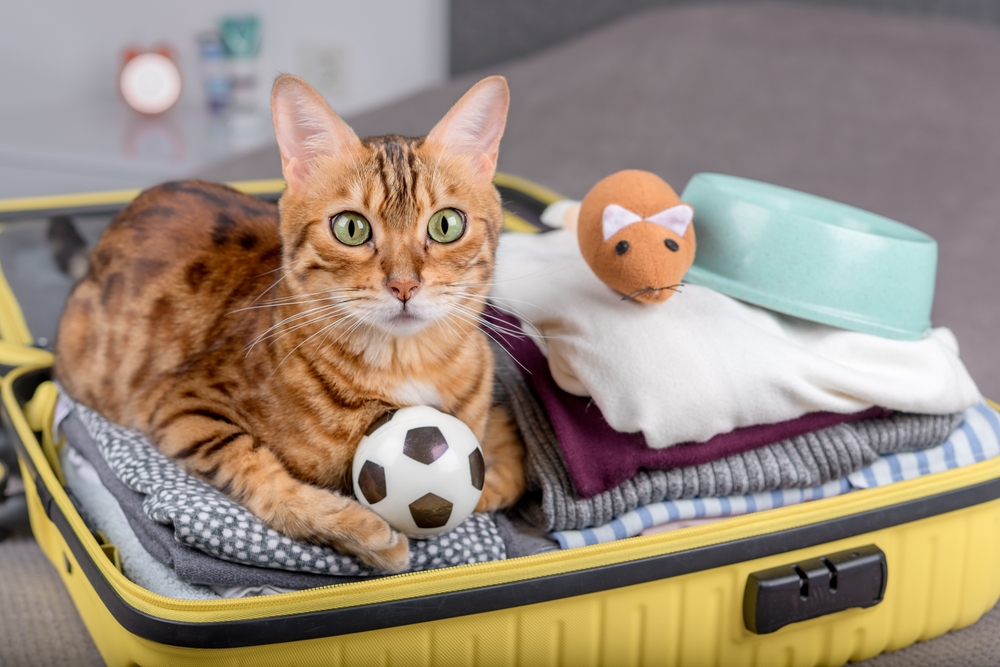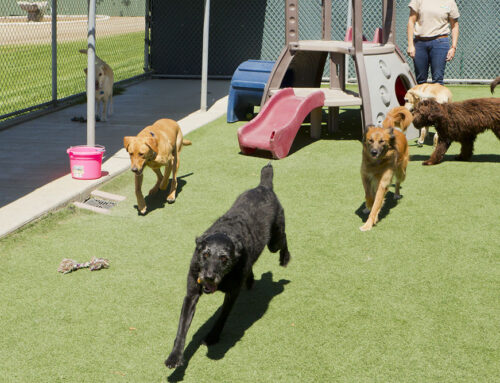No matter how much you love your pet, you can’t always take them with you. Whether you’re traveling for business, pleasure, or an unexpected emergency, knowing where you’ll board your dog or cat and what you can expect can minimize travel-related stress for you and your pet.
Animal Clinic of Council Bluffs is proud to offer standard pet boarding services for our clients. Our veterinary-supervised facility is the perfect place for pets who need extra TLC and owners who prefer extra peace-of-mind. But, no matter where your four-legged friend spends their “staycation,” here’s what you need to know to ensure a safe and pleasant experience.
#1: Visit the accommodations without your pet
Contact the boarding facility in advance and request a tour of their pet accommodations. Boarding facilities and pet resorts should be open and transparent about their services and spaces, although they may ask that you avoid busy drop-off and pick-up times when you visit. Any facility that refuses a tour should be crossed off your list.
During your tour, you should assess the property for safety, and pet and facility cleanliness, and ask questions about their services, such as playtimes, grooming, or veterinary care.
#2: Ensure your pet meets the facility’s health requirements
Pet boarding facilities should maintain strict health criteria to protect four-legged guests from communicable diseases. For example, at Animal Clinic of Council Bluffs, we require:
- Current exam — All pets must be up-to-date on their annual examination. New pets (i.e., non-patients) must be examined by one of our veterinarians prior to boarding.
- Updated vaccines — Although exact policies may vary, all boarding facilities require that pets be vaccinated against transmissible diseases. Vaccinations must be administered 10 to 14 days prior to boarding to ensure an effective immune response.
- Temperament assessment — Aggressive dogs and cats can put themselves, staff, and fellow boarders at risk, so our facility, and most others, requires a basic behavior assessment to ensure everyone’s safety.
#3: Ask about their pet care policies
Enquire about the facility’s systems and protocols that maximize pet safety and comfort. Topics should include:
- Safety — What protective measures are in place to prevent escape? How do caretakers prevent face-to-face interactions between boarding pets?
- Emergencies and illness — How are pets cared for if they become sick or injured during their stay? As a veterinary-supervised facility, Animal Clinic of Council Bluffs will notify you about your sick or injured pet and administer necessary treatment.
- Exercise — How frequently are dogs taken outside to eliminate? Are walk or play times scheduled with the staff? How often? Proper social attention and exercise can reduce boarding stress and anxiety.
- Staff — Are the caretakers experienced, veterinary credentialed, or certified in pet care or husbandry?
- Storms and natural events — How does the facility help noise-sensitive pets stay calm during thunderstorms and fireworks?
#4: Anxious pet? Try a pre-stay visit or sleepover
If you’re concerned about how your pet will handle being away from home, ask if you can practice “happy visits.” Take your pet to the facility’s parking lot or lobby and then return home. Gradually increase your visits, until your pet is familiar with the facility, and leave them for a paid one-night “sleepover.” This will help you predict your pet’s response to a longer stay and, if necessary, seek additional training or anxiety-reducing treatments prior to your departure.
#5: Request refills for your pet’s medication or food
If your pet takes medication or is on a special diet, you’ll need to bring these items when you board your pet. A few weeks before your pet’s scheduled stay, assess your inventory for each item and request refills, if necessary. Being proactive ensures the food or medication will arrive on time and that your pet’s care won’t be interrupted during your absence.
If your pet occasionally suffers from noise sensitivity or stress colitis (i.e., diarrhea) episodes, ask your Animal Clinic of Council Bluffs veterinarian about prescribing a small quantity of as-needed medication.
#6: Crate train or review crate training skills with your pet
Crate-trained pets generally cope with the boarding experience better than untrained pets, because proper crate training helps pets feel safe and secure during confinement and owner separation, rather than frightened, anxious, and confused.
If your pet hasn’t been crated since they were a puppy or kitten, dust off their den and reacquaint them with their home away from home.
- Pair confinement with positive rewards (e.g., meals, treats, fun toys).
- Confine your pet for short periods every day.
- Gradually increase duration and distance for anxious pets.
#7: Know what to pack for your pet

Although you are likely tempted to pack all your pet’s creature comforts, most boarding facilities place restrictions on pet “luggage” to prevent loss or damage.
Find out what your pet’s accommodations will and won’t allow, and then label the approved items with your pet’s name and your phone number. Keep your pet’s medications in their original containers or packaging. Finally, provide specific instructions or information about your pet’s likes or dislikes that will help the staff provide more personalized care.
Whether it’s the first time or the 50th time you’ve boarded your pet, you will always worry about trusting their care to someone else. But, the more you know about your pet’s accommodation and care, the more likely you’ll both have a stress-free and safe experience. And before you know it, you’ll be home at last and together again.
For more information about boarding at Animal Clinic of Council Bluffs, or to schedule your pet’s pre-boarding health assessment and vaccinations, contact our team.






Leave A Comment